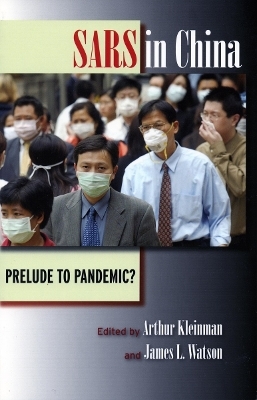
SARS in China
Stanford University Press (Verlag)
978-0-8047-5313-5 (ISBN)
The SARS epidemic of 2003 was one of the most serious public health crises of our times. The event, which lasted only a few months, is best seen as a warning shot, a wake-up call for public health professionals, security officials, economic planners, and policy makers everywhere.
SARS in China addresses the structure and impact of the epidemic and its short and medium range implications for an interconnected, globalized world. Warnings from the World Health Organization (WHO) and the Centers for Disease Control and Prevention (CDC) made it clear that SARS may have been a prelude to bigger things. The authors of this volume focus on specific aspects of the SARS outbreak—epidemiological, political, economic, social, cultural, and moral. They analyze SARS as a form of social suffering and raise questions about the relevance of national sovereignty in the face of such global threats. Taken together, these essays demonstrate that SARS had the potential of becoming a major turning point in human history. This book forces us to ask what we have learned from SARS as we go on to face newer, and farther-reaching pandemics. The current case of the COVID-19 outbreak amplifies the urgency of this question, and illuminates the strengths and shortcomings of different national responses to such pandemics.
Contributors:
Erik Eckholm
Joan Kaufman
Arthur Kleinman
Dominic Lee
Sing Lee
Megan Murray
Thomas G. Rawski
Tony Saich
Alan Schnur
James L. Watson
Hong Zhang
Yun Kwok Wing
Arthur Kleinman is Esther and Sidney Rabb Professor and Chair of the Department of Anthropology, Harvard University, and Professor of Medical Anthropology and Social Medicine at the Harvard Medical School. James L. Watson is Fairbank Professor of Chinese Society and Professor of Anthropology at Harvard University. He is also the author of Golden Arches East: McDonald's in East Asia (Stanford University Press, 1997).
Contents Prefacevii Contributorsxi Introduction: SARS in Social and Historical Context1 arthur kleinman and james l. watson Part I. The Epidemiological and Public Health Background 1.The Epidemiology of SARS17 megan murray 2.The Role of the World Health Organization in Combating SARS, Focusing on the Efforts in China31 alan schnur 3.SARS and China's Health-Care Response: Better to Be Both Red and Expert!53 joan kaufman Part II. Economic and Political Consequences 4.Is SARS China's Chernobyl or Much Ado About Nothing? 71 tony saich 5.SARS and China's Economy105 thomas g. rawski 6.SARS in Beijing: The Unraveling of a Cover-Up 122 erik eckholm Part III: Social, Moral, and Psychological Consequences 7.Psychological Responses to SARS in Hong Kong-- Report from the Front Line133 dominic t. s. lee, m.d., and yung kwok wing, mrcpsych 8.Making Light of the Dark Side: SARS Jokes and Humor in China148 hong zhang Part IV: Globalization and Cross-Cultural Issues 9.SARS and the Problem of Social Stigma173 arthur kleinman and sing lee 10.SARS and the Consequences for Globalization196 james l. watson Notes205Index235
| Zusatzinfo | 6 figures |
|---|---|
| Verlagsort | Palo Alto |
| Sprache | englisch |
| Maße | 140 x 216 mm |
| Gewicht | 390 g |
| Themenwelt | Medizin / Pharmazie ► Gesundheitswesen |
| Studium ► Querschnittsbereiche ► Epidemiologie / Med. Biometrie | |
| Sozialwissenschaften ► Politik / Verwaltung ► Staat / Verwaltung | |
| ISBN-10 | 0-8047-5313-X / 080475313X |
| ISBN-13 | 978-0-8047-5313-5 / 9780804753135 |
| Zustand | Neuware |
| Informationen gemäß Produktsicherheitsverordnung (GPSR) | |
| Haben Sie eine Frage zum Produkt? |
aus dem Bereich


